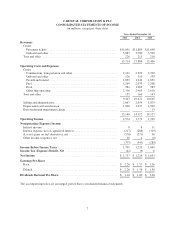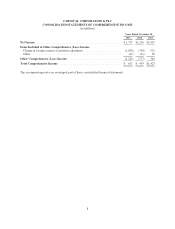Carnival Cruises 2015 Annual Report Download - page 19
Download and view the complete annual report
Please find page 19 of the 2015 Carnival Cruises annual report below. You can navigate through the pages in the report by either clicking on the pages listed below, or by using the keyword search tool below to find specific information within the annual report.comprehensive income (“AOCI”), which is a separate component of shareholders’ equity. Therefore, the U.S.
dollar value of the non-equity translated items in our consolidated financial statements will fluctuate from period
to period, depending on the changing value of the U.S. dollar versus these currencies.
We execute transactions in a number of different currencies, principally the euro, sterling and Australian,
Canadian and U.S. dollars. Exchange rate gains and losses arising from changes in foreign currency exchange
rates between the time an expense is recorded and when it is settled as well as the remeasurement of monetary
assets and liabilities, all denominated in a currency other than the functional currency of the entity involved, are
recognized currently in nonoperating earnings, unless such monetary liabilities have been designated to act as
hedges of net investments in our foreign operations. The net gains or losses resulting from these “nonoperating
foreign currency transactions” were insignificant in 2015, 2014 and 2013. In addition, the unrealized gains or
losses on our long-term intercompany receivables denominated in a non-functional currency, which are not
expected to be repaid in the foreseeable future and are therefore considered to form part of our net investments,
are recorded as foreign currency translation adjustments, which are included as a component of AOCI.
Share-Based Compensation
We recognize compensation expense for all share-based compensation awards using the fair value method. For
time-based share awards, we recognize compensation cost ratably using the straight-line attribution method over
the expected vesting period or to the retirement eligibility date, if less than the vesting period, when vesting is not
contingent upon any future performance. For performance-based share awards, we generally recognize
compensation cost ratably using the straight-line attribution method over the expected vesting period based on
the probability of the performance condition being achieved. If all or a portion of the performance condition is
not expected to be met, the appropriate amount of previously recognized compensation expense will be reversed
and future compensation expense will be adjusted accordingly. For market-based share awards, we recognize
compensation cost ratably using the straight-line attribution method over the expected vesting period. If the target
market conditions are not expected to be met, compensation expense will still be recognized. In addition, we
estimate the amount of expected forfeitures based on historical forfeiture experience when calculating
compensation cost. We revise our forfeiture estimates, if the actual forfeitures that occur are significantly
different from our estimates.
Earnings Per Share
Basic earnings per share is computed by dividing net income by the weighted-average number of shares
outstanding during each period. Diluted earnings per share is computed by dividing net income by the weighted-
average number of shares and common stock equivalents outstanding during each period. For earnings per share
purposes, Carnival Corporation common stock and Carnival plc ordinary shares are considered a single class of
shares since they have equivalent rights (see Note 3).
Accounting Pronouncements
In 2014, amended guidance was issued by the Financial Accounting Standards Board (“FASB”) regarding the
accounting for Service Concession Arrangements. The new guidance defines a service concession as an
arrangement between a public-sector grantor, such as a port authority, and a company that will operate and
maintain the grantor’s infrastructure for a specified period of time. In exchange, the company may be given a
right to charge the public, such as our cruise guests, for the use of the infrastructure. This guidance will require
us to record the infrastructure we have constructed to be used by us pursuant to a service concession arrangement
outside of property and equipment. As required, we will adopt this guidance in our first quarter of 2016. Such
adoption will not have a material impact to our consolidated financial statements.
In 2014, the FASB issued Revenue from Contracts with Customers, which requires an entity to recognize the
amount of revenue to which it expects to be entitled for the transfer of promised goods or services to customers.
17
























